The benefits of online advertising are many, and has evolved into an essential tool for companies to communicate with the customers they seek. It increases your visibility and attracts potential customers, regardless of the size of your business or whether you run a startup or a multinational corporation.
In this article, we’ll talk about the benefits of online advertising and how it can help your business grow in the digital age.
The Difference Between Online Advertising and Traditional Advertising
In the contemporary world of paid advertising, the debate between online advertising (part of digital marketing) and traditional advertising has been prevalent:
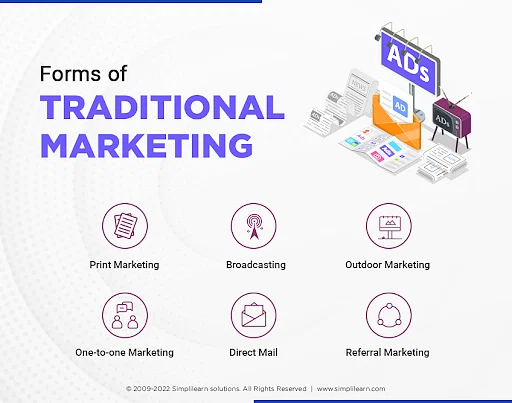
As the marketing landscape evolves, it’s essential to understand these two distinct types and how they differ.
Traditional advertising, as the name suggests, incorporates the age-old methods of reaching out to consumers. Think about billboard advertisements, print media such as magazines and newspapers, radio spots, television commercials and billboards.
When you recollect a catchy jingle from your childhood or picture the iconic billboards of Times Square, that’s traditional advertising in action. It’s tangible, often eye-catching, and has a tendency to leave a lasting impact.
Online advertising, on the other hand (also known as digital advertising), is a fast-growing child of the digital era. It’s about using digital channels like websites, social media platforms, search engines and email for marketing communication.
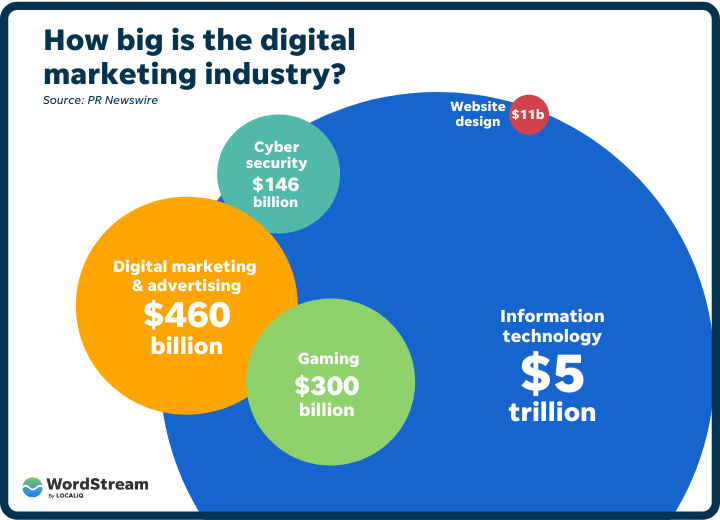
Remember the last time an ad for that pair of sneakers you’d been eyeing popped up in your Facebook feed? Or how your inbox receives promotional emails about the latest sales? That’s online advertising doing its work.
While both aim to communicate a brand’s message and induce consumers to purchase products or services, they engage audiences differently:
- Traditional advertising is often passive and one-way. The audience receives the message, but there’s no direct channel for immediate response or engagement. It’s also generally broader in its targeting, focusing on demographics rather than individual behaviors.
- Online advertising is interactive and two-way. It allows direct engagement between the brand and the consumer. Consumers can like, share or comment on an ad, providing immediate feedback.
Plus, with the plethora of user data available online, brands can hyper-target their ads to reach specific groups based on their preferences, behaviors and even their online search histories.
They both have their advantages and limitations:
- Traditional advertising can be expensive and measuring campaign success can be challenging.
- Online advertising, though more cost-effective and easy to measure, can be seen as intrusive if not done right. Plus, the digital ads’ fleeting nature means they might be forgotten as soon as the consumer scrolls past them.
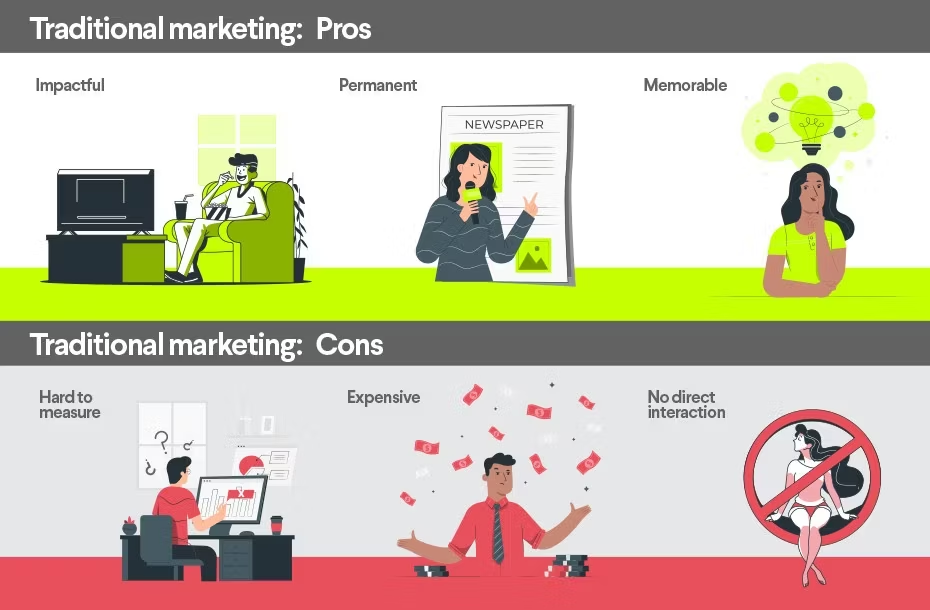
Ultimately, the choice between online and traditional advertising should be determined by your business needs, budget and, most importantly, your target audience’s preferences. In an ideal world, a balanced blend of both could potentially yield the best results, reaching consumers at every touchpoint.
However, this blend would need to be carefully tailored, bearing in mind the unique aspects of each type of advertising. The key lies in using each method to its best advantage while maintaining a unified, consistent brand message.
Dive Deeper: 9 Types of Online Advertising Techniques to Elevate Your Marketing
10 Benefits of Online Advertising
Online marketing has revolutionized how businesses connect with their target audience, offering many advantages that can propel them to new heights of success.
So let’s delve deeper into the ten key benefits to brands in the ever-evolving digital landscape.
1) Global Reach
Online advertising can exponentially widen the scope of your business’s visibility. Unlike traditional advertising methods restricted by geographical boundaries, the internet offers an expansive platform that can reach potential customers worldwide.
No matter where your business is based, your digital ads can connect you with consumers from every corner of the globe. This wide reach is essential for growing brand awareness and establishing an international presence.
Here are some ways to capitalize on your reach:
- Leverage social media platforms: Platforms like Facebook, Instagram and LinkedIn have users worldwide. Using these platforms for advertising can help you reach a larger audience.
- Use search engine advertising: Google and other search engines are used globally, making them an effective platform for reaching international customers.
- Create multilingual content: If you’re aiming for a global reach, consider creating content in multiple languages to cater to non-English speakers.
2) Cost-Effective Advertising
While traditional advertising mediums like TV, print and radio can be quite expensive, online advertising usually offers a more affordable alternative. Digital ads can be tailored to fit any budget size, from small startups to large corporations:
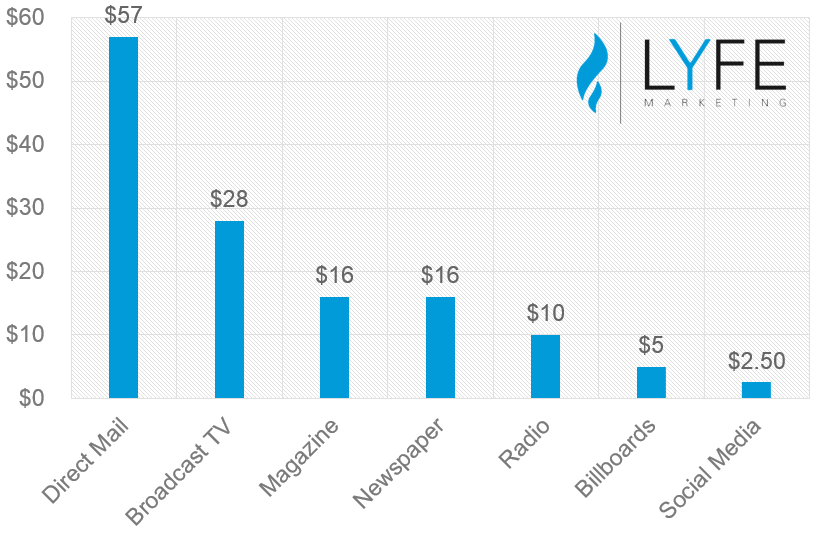
Moreover, with precise targeting capabilities and real-time performance monitoring, online advertising can often yield a higher return on investment. This makes it a cost-efficient way to promote your brand and reach your target audience.
Here’s how you can maximize your return on investment (ROI):
- Implement pay-per-click advertising: With PPC, you only pay when a user clicks on your ad, making it a cost-effective solution for many businesses.
- Optimize your ads: Use A/B testing to determine which ads perform best, and allocate more of your budget to high-performing ads.
- Use free promotional tools: From organic social media posts to SEO, there are various free online advertising options to explore.
3) Real-Time Performance Analysis
One of the standout benefits of online advertising is the ability to track and measure your campaign performance in real-time. Tools like Google Analytics and Facebook Insights provide valuable data on ad impressions, click-through rates, conversions, and more.
This immediate access to performance metrics empowers businesses to adjust strategies on the fly, making necessary tweaks to optimize results, and ensure that every dollar spent is worth it.
Here are some performance analysis tips to keep in mind:
- Use analytics tools: Platforms like Google Analytics and Facebook Insights offer valuable performance metrics such as ad impressions, click-through rates, and conversion rates.
- React to analytics in real-time: If your campaign is underperforming, you can quickly adjust your strategy based on your analytics.
- Experiment with different strategies: Real-time analytics allows you to experiment with different strategies and quickly determine what works best for your brand.
4) Precision Targeting
Online advertising platforms provide advanced targeting options, allowing you to go after your desired audience based on demographics, interests, behavior, and more:
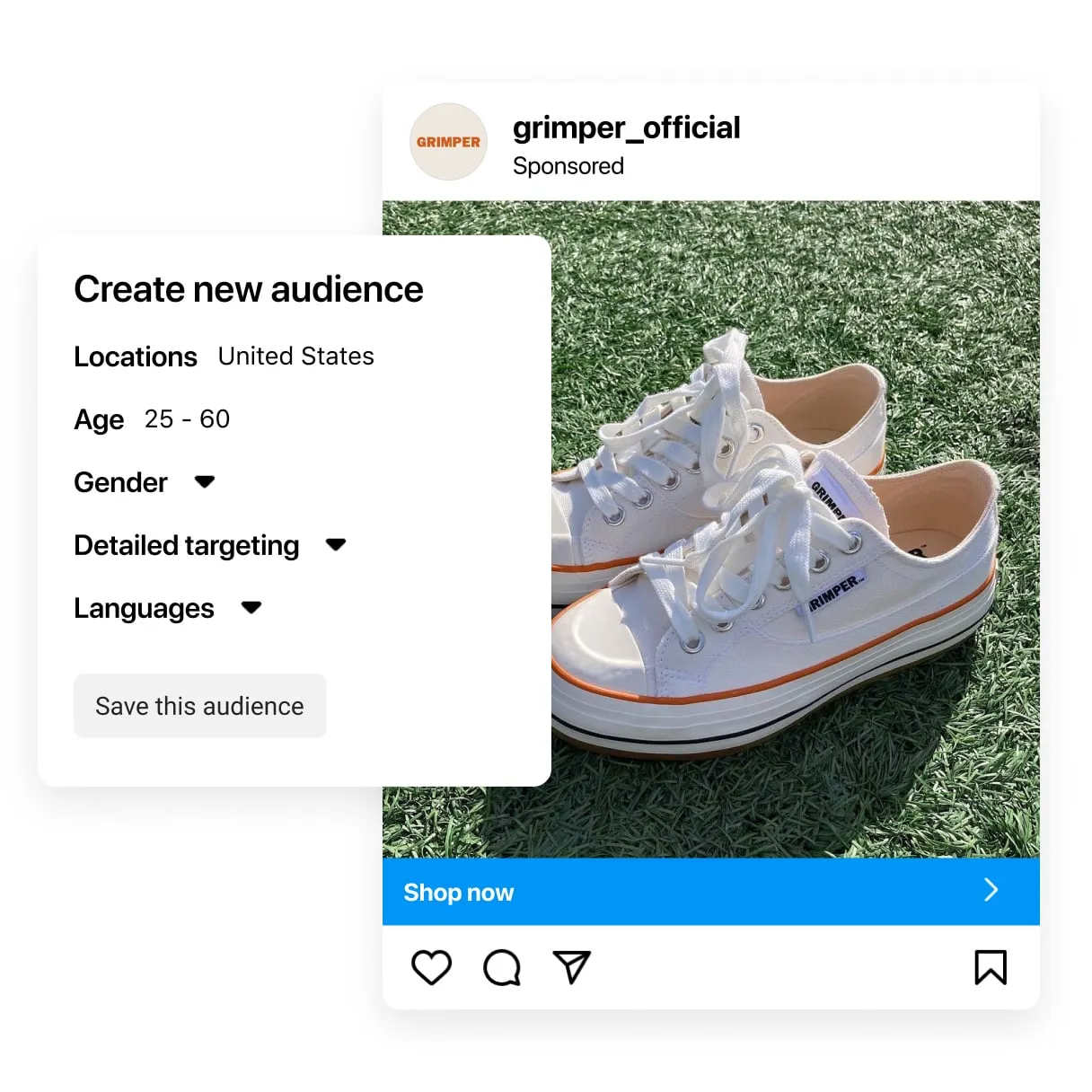
Whether you’re targeting young fitness enthusiasts or senior literature buffs, digital ads enable you to reach the people most likely to be interested in your product or service. This increased relevancy can significantly improve engagement rates and conversion chances.
Here are a few ways you can better reach your target audience:
- Use platform targeting tools: Most online advertising platforms provide various targeting options, such as demographic, interest and behavioral targeting.
- Create personalized ad content: Based on your audience’s preferences and behaviors, create personalized ads to increase engagement.
- Use retargeting strategies: Retargeting allows you to show ads to people who have previously interacted with your brand or visited your website:

Dive Deeper: The Difference Between Retargeting and Remarketing
5) High Engagement
Online advertising can be highly interactive, engaging users in ways traditional advertising mediums can’t. Whether it’s through immersive video ads, dynamic content or interactive social media posts, digital advertising invites your audience to engage with your brand on a deeper level.
This increased interaction can foster strong relationships, boost brand loyalty and encourage word-of-mouth marketing.
Here are some ways to boost engagement:
- Create interactive content: Use immersive video ads, interactive content, and dynamic content to encourage user interaction.
- Encourage user-generated content: Run contests or ad campaigns that encourage users to create and share content related to your brand.
- Engage in social listening: Pay attention to comments and discussions about your brand and engage with users directly when appropriate.
Dive Deeper: 8 Ways to Encourage More User-Generated Content (UGC)
6) Driving App Downloads
If your business has a mobile app, online advertising can significantly boost your app downloads. Many digital platforms, like Twitter, have a majority of users accessing their service via mobile devices:
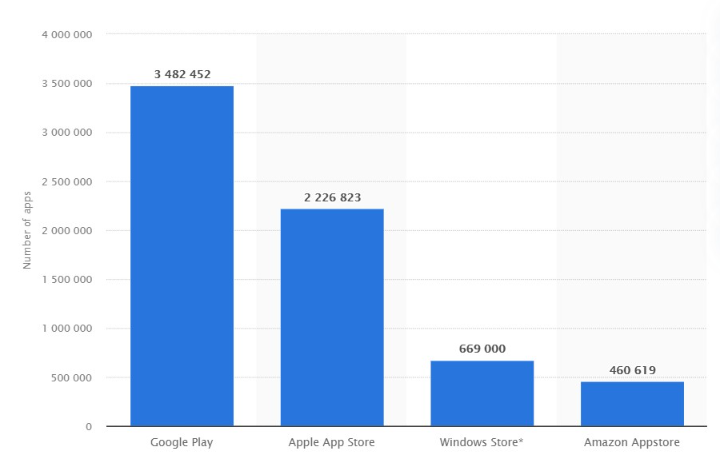
Advertisements encouraging users to install your app not only increase your app’s user base but also open up another avenue for customer engagement and revenue generation.
Here’s how you can drive more app downloads:
- Promote your app on social media: Many social media users are on mobile devices, making these platforms ideal for promoting your app.
- Use in-app advertising: Platforms like Facebook and Google offer in-app advertising options.
- Offer incentives for downloading your app: Discounts, exclusive content and other incentives can encourage users to download your app.
7) Boosting Brand Visibility
Online advertising plays a crucial role in increasing brand visibility. By consistently displaying your ads on search engines, social media platforms and other digital spaces, your brand gains increased exposure:
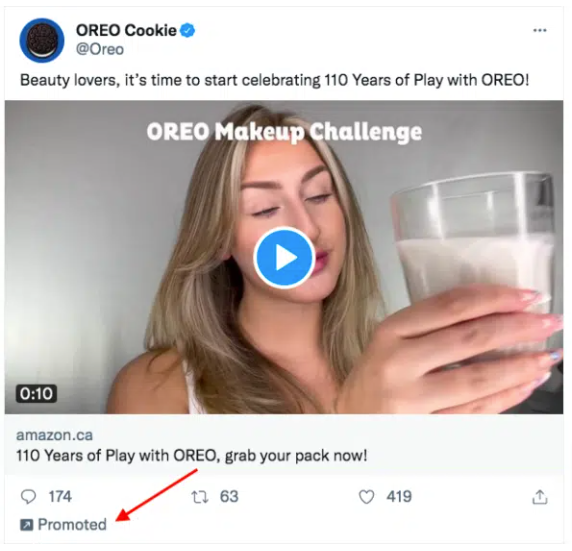
This omnipresence helps keep your brand at the top of consumers’ minds, enhancing brand recognition and aiding recall when the time for purchase comes.
Here are three ways you can use digital marketing to boost your brand:
- Invest in search engine marketing: Use SEO and paid search ads, which are part of SEM, to increase your brand’s visibility on search engine results pages.
- Maintain a consistent social media presence: Regularly posting engaging content on social media can keep your brand at the top of users’ feeds.
- Collaborate with influencers: Partnering with influencers can introduce your brand to new audiences and increase visibility.
Dive Deeper: What Is the Difference Between SEM and SEO?
8) Exploiting Trends and Current Events
The dynamic nature of the internet allows businesses to tap into real-time trends and current events, creating timely and relevant ads.
Whether it’s a viral social media challenge, a trending hashtag or a hot-off-the-press news event, integrating these elements into your ads can make them more engaging and shareable, driving more buzz around your brand.
Here are some ideas to consider:
- Stay current on trending topics: Use tools like Google Trends or Twitter’s Trending Topics to stay informed about what’s currently popular.
- Create timely content: If a topic relevant to your brand is trending, create and promote content related to that topic.
- Leverage viral challenges or memes: If appropriate for your brand, participating in viral challenges or memes can increase your brand’s visibility and engagement.
9) Flexibility
Online advertising offers unmatched flexibility. If a certain ad or campaign isn’t performing well, you can quickly adjust or halt it, saving precious resources.
This ability to pivot and adapt quickly is crucial in the fast-paced digital world where consumer trends and interests can shift rapidly.
Here are a few tips to make use of digital marketing’s flexibility:
- Regularly review and adjust your strategy: If an ad or campaign isn’t performing well, you can quickly change it based on real-time data.
- Try different platforms and formats: Experiment with different ad platforms and formats to see what works best for your brand.
- Scale campaigns based on performance: If a campaign is performing well, you can easily increase its budget or reach. If it’s underperforming, you can decrease its scale or stop it altogether.
10) Potential for Viral Marketing
Online advertising, especially on social media platforms, holds the potential for your content to go viral. A single share by a user can put your content in front of hundreds or even thousands of potential customers.
Creating engaging and shareable ads can trigger a domino effect of shares, amplifying your reach and potentially leading to a significant spike in brand awareness and customer conversions.
Here are a few things to keep in mind if you want to go viral:
- Create shareable content: Whether it’s an engaging video, an informative infographic or a compelling story, creating content that users want to share increases its potential to go viral.
- Encourage user interaction: Prompt your target audience to like, share, comment, or participate in some other way with your content.
- Use social media influencers: Influencers can amplify your content’s reach and increase its potential to go viral.
Dive Deeper: Demystifying Google Paid Ads: A Beginner’s Guide for Online Advertising
Takeaways: The Benefits of Online Advertising
In today’s highly competitive market, companies must recognize the myriad benefits of online marketing.
It is essential to be aware of the various forms of online advertising currently available and to ensure that you maximize your results by utilizing strategies such as content marketing and search engine optimization.
Keep in mind that reaching relevant websites with ads of high quality will assist in establishing trust with potential customers, which will, in turn, result in an increase in the rate of conversions over time. I
If you put these suggestions into practice in the right way, you will undoubtedly come up with a winning strategy!
If you’re ready to level up your content with powerful advertising, Single Grain’s paid ads experts can help!👇



